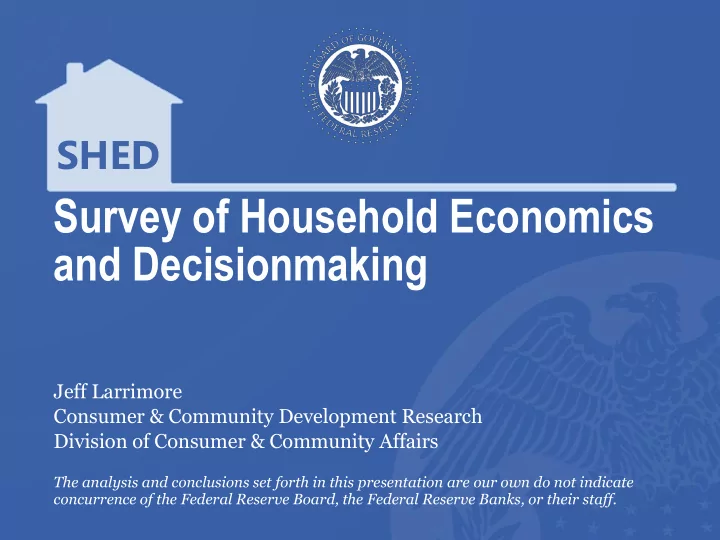

SHED Survey of Household Economics and Decisionmaking Jeff Larrimore Consumer & Community Development Research Division of Consumer & Community Affairs The analysis and conclusions set forth in this presentation are our own do not indicate concurrence of the Federal Reserve Board, the Federal Reserve Banks, or their staff.
INTRODUCTION Survey Background • Annual survey on financial well-being conducted each fall since 2013 • Designed with three primary motivations 1. Help monitor trends in consumer behavior and sentiment as they relate to household finances and the broader economy 2. Cast light on current issues affecting financial well-being, particularly among low- and moderate-income populations 3. Fill data gaps and provide insights into questions for which there may not be other reliable data sources Findings and data released on May 19 in the Report on the Economic Well-Being of U.S. Households in 2016 Board of Governors of the Federal Reserve System 2
INTRODUCTION Topics Covered in Report SECTION SECTION 1 6 Economic Well-Being Housing and Living Arrangements SECTION SECTION 2 7 Employment Education and Human Capital SECTION SECTION 3 8 Income and Savings Student Loans SECTION SECTION 4 9 Economic Preparedness Retirement and Emergency Savings SECTION 5 Banking and Credit Board of Governors of the Federal Reserve System 3 3
OVERALL WELL-BEING Self-assessed Financial Well-being Which one of the following best describes how well you are managing financially these days? Living Doing comfortably okay 2013 25% 38% 62% 2014 25% 40% 65% 2015 28% 41% 69% 2016 29% 40% 70% 0% 10% 20% 30% 40% 50% 60% 70% 80% Asked of all respondents. n = 6,610 in 2016 Board of Governors of the Federal Reserve System 4
OVERALL WELL-BEING Ability to Handle Current Month’s Bills How would a $400 emergency Do you expect to be able to pay all expense that you had to pay of your current month’s bills in impact your ability to pay your full? other bills this month? 76% 80% 80% 63% 60% 60% 35% 40% 40% 23% 20% 20% 0% 0% Current situation With a $400 emergency expense Asked of all respondents. n = 6,610 in 2016 Board of Governors of the Federal Reserve System 5
Education TOP TAKEAWAYS Board of Governors of the Federal Reserve System 6
EMPLOYMENT AND INCOME Childhood Concerns Percent of young adults (under age 40) saying that they sometimes or regularly worried about each of the following when they were growing up 50% 44% 40% 33% 28% 27% 27% 30% 20% 20% 16% 16% 12% 11% 8% 7% 10% 0% Family's finances Having enough food Crime / personal Having a stable to eat safety caregiver Both parents HS degree or less At least 1 with some college At least 1 with Bachelor's degree Among young adults under age 40. n = 1,699 in 2016 Board of Governors of the Federal Reserve System 7
EDUCATION DECISIONS Value of Degree by Choice of Major Among respondents with at least an associate degree Overall how would you say the lifetime financial benefits of your education compare to the financial costs? Benefits About Costs higher equal higher STEM 72% 15% 13% Business 70% 18% 11% Education 65% 19% 15% Health 63% 25% 11% Social Sciences & Humanities 52% 25% 23% Vocational 51% 32% 17% All Other 48% 24% 26% 0% 20% 40% 60% 80% 100% Among respondents who completed at least an Associate Degree. n = 2,825 Board of Governors of the Federal Reserve System 8
EDUCATION DECISIONS Value of Degree Overall how would you say the lifetime financial benefits of your education compare to the financial costs? Benefits About Costs higher equal higher No degree, public 36% 37% 25% 41% 32% 26% No degree, private not-for-profit 34% 29% 35% No degree, private for-profit 65% 21% 14% Completed degree, public Completed degree, private not-for-profit 65% 19% 16% Completed degree, private for-profit 40% 21% 39% 0% 20% 40% 60% 80% 100% Among respondents who attended college and report the institution attended. n = 3,929 Board of Governors of the Federal Reserve System 9
Recommend
More recommend